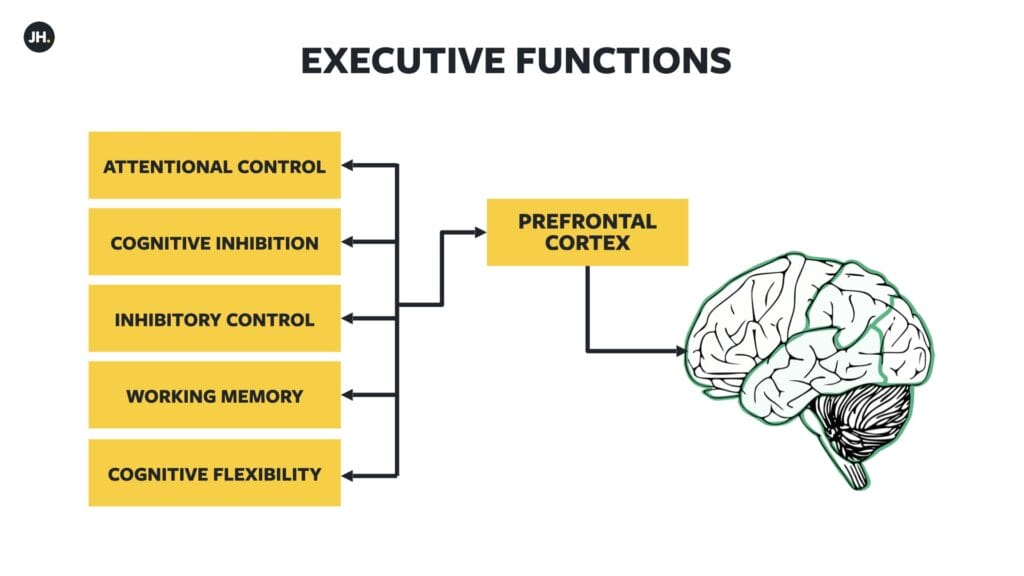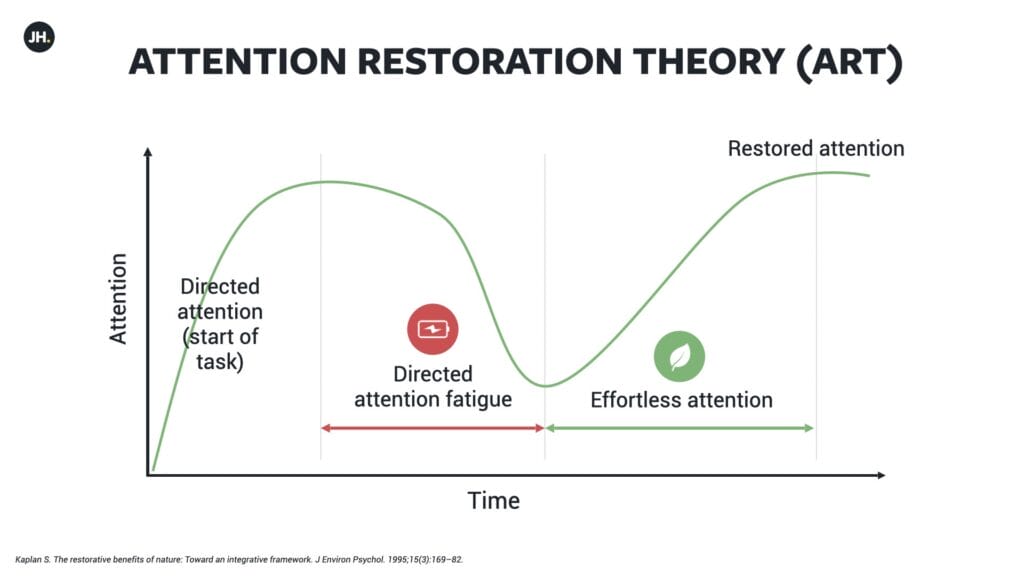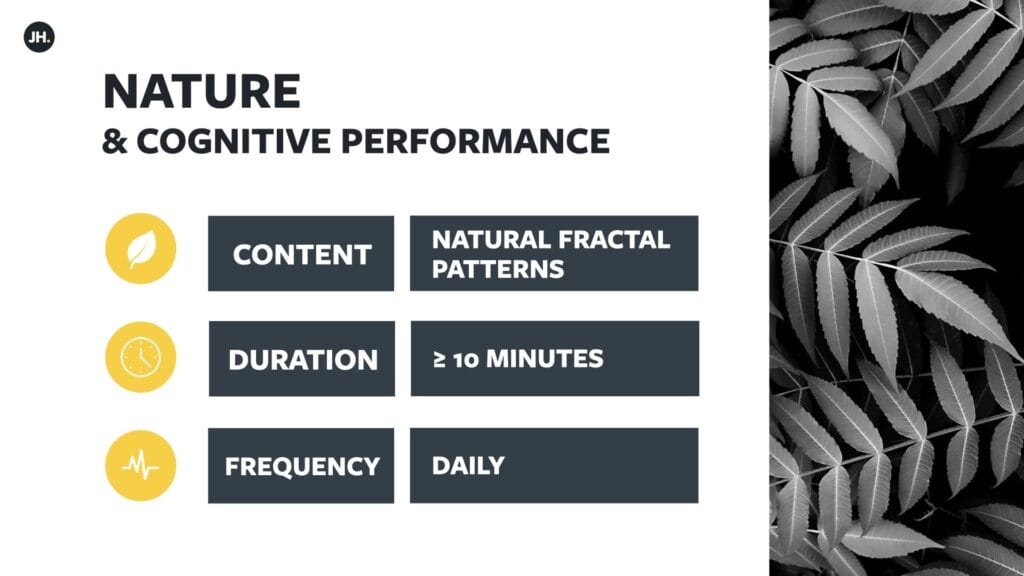We are spending more time indoors than any generation before us. Some research suggests that we spend almost 90% of our time inside1. There are plenty of good reasons to go outdoors but did you know that spending time in nature, and even looking at pictures of nature, can measurably improve cognitive performance? Read on to discover what aspects of cognitive performance are enhanced and how much time is required to enjoy this brain upgrade. You can also find a link to an online cognitive test which you could use to assess the impact of taking an outdoor break on your own performance.
We Are An Indoor Generation
I love spending time outside, but I am part of the indoor generation. Even though I live in the countryside, I work in urban environments. All too often, my days are spent hopping from one enclosed space to another. Even a walk across a city to a meeting, or a bike ride at lunch, represent tiny fractions of the day. This pattern of living is a recent development. Our hunter-gatherer ancestors spent large portions of their waking hours outdoors. It’s not surprising that the benefits of spending time outside are numerous, ranging from better regulated circadian rhythms and improved sleep to elevated mood. Several experiments have demonstrated that spending time in nature can boost cognitive performance, but the results are varied. However, a recent review of the evidence has inspired me to prioritise spending time outside every day, for both wellbeing and performance benefits.
Nature Switches On Your Brain
It may not seem like it, as you walk down and the street and see everyone fixated on their smartphone, but our species is built for hunting and gathering. Natural environments feature the resources that enable human survival: food, water, raw materials and shelter, for example, and when we spend time in nature, our body and brain ‘switches on’. Even very brief exposures to natural stimuli, such as viewing images of nature for a short duration, can have a measurable impact, particularly on the regions of the brain in the prefrontal cortex, associated with executive functions and directed attention.

Attention Restoration Theory (ART) proposes a model to describe how natural environments can improve cognitive performance. ART distinguishes between two forms of attention: directed attention and effortless attention.
- Directed attention enables us to remain focused on effortful tasks for extended periods.
- Involuntary attention is effortless, automatic, and is induced by intrinsically interesting or exciting stimuli.
For example, if you spend the morning at your computer, even if you were just working through e-mails, your attention will be effortfully directed at this task. It’s fatiguing, and motivation is likely to drop the more time you spend on the job. Eventually, you will notice that your directed attention begins to fatigue. However, if you were to spend a few minutes gazing out of the window, or if you took a walk in a park, your cognitive resources and motivation will begin to recover.

Measuring The Impact Of Nature On Cognitive Performance
A recent study set out to measure the impact of nature on cognitive performance by reviewing several experiments which contrasted natural and urban environments and measured cognitive performance using a test called the Backwards Digit Span (BDS). The BDS is a classic test of working memory performance and poses an extreme challenge for directed attention. The test requires
- Encoding: Taking in the information.
- Maintenance: Keeping hold of the information.
- Active processing: Manipulating the information (reversing the digit order, in this case).
- Updating: Refreshing the information in working memory.
Performance in the BDS likely translates to the real world, as working memory is such a fundamental cognitive capability. In fact, the name ‘working memory’ undersells how vital this capability is. A more helpful way to think about working memory is as a system for ‘attention to memory’ rather than as a memory system in itself4,5.
What Should You Look At & How Much Time Do You Need?
When we are exposed to trees, leaves and clouds in the sky; natural stimuli featuring fractal patterns, our mood improves, motivation increases and cognitive performance increases2. The extent of the contrast between natural and urban also seems to play a role: the more natural the environment, the better.

The review also supports the idea that there is a dose-response relationship between spending time in nature and improved performance: longer durations and higher frequency appears to have a greater effect, but even looking at pictures of nature, for 10 minutes, is associated with positive, measurable improvements. Based on the study results, ideally, you would find the time to take a walk in a natural environment for anywhere between 15-55 minutes. The studies examined in the review did not include other activities, but the ART model suggests other activities in natural settings should be effective, providing that they do not require directed attention. If you’re stuck in the office, or on a plane, for example, you could still boost your cognitive performance by watching a few minutes of video montage. There are several ‘relaxation channels’ available on YouTube. In summary, you should think about the content, duration and frequency.
Measure Your Cognitive Performance
One of the challenges of trying to translate scientific research to recommendations is that most results are reported at a group level. This can mask individual variability. Some people likely experience a more substantial effect, no effect, or even adverse effects. Fortunately, the ubiquity of the BDS cognitive test in research means that several websites offer the opportunity to self-administer the test, for free. I don’t have any link with this site, but you can find a memory loss test example here. If you want to use the test in a similar way to the experiments in the study, click the ‘Forward’ button, so ‘Reverse’ displays.
There is a practise effect, so complete a couple of test repetitions before spending time in, or looking at a natural environment. Complete the test again and see if your performance improves. Can you remember a greater span of numbers? Are you able to recall the same span at a higher frequency? I’m interested to hear how you get on, so let me know here in the comments, or on twitter.
References
- Klepeis NE, Nelson WC, Ott WR, Robinson JP, Tsang AM, Switzer P, et al. The National Human Activity Pattern Survey (NHAPS): A resource for assessing exposure to environmental pollutants. J Expo Anal Environ Epidemiol. 2001;11(3):231–52.
- Stenfors CUD, Van Hedger SC, Schertz KE, Meyer FAC, Smith KEL, Norman GJ, et al. Positive effects of nature on cognitive performance across multiple experiments: Test order but not affect modulates the cognitive effects. Front Psychol. 2019;10(JUL).
- Kaplan S. The restorative benefits of nature: Toward an integrative framework. J Environ Psychol. 1995;15(3):169–82.
- Oberauer K, Süß H-M, Wilhelm O, Sander N. Individual Differences in Working Memory Capacity and Reasoning Ability. In: Conway A, Jarrold C, Kane M, Miyake A, Towse J, editors. Variation in Working Memory. 1st ed. New York: Oxford University Press; 2007. p. 49–75.
- Souza AS, Oberauer K. In search of the focus of attention in working memory: 13 years of the retro-cue effect. Attention, Perception, Psychophys [Internet]. 2016;78(7):1839–60.

